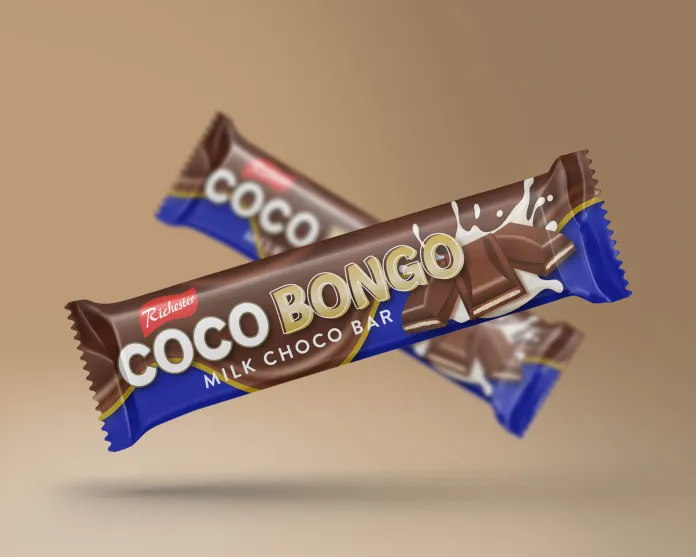25 April, 2022: Price hikes giving you the blues? Richester Foods has come to the rescue with the launch of Coco Bongo, a 100% locally made chocolate on sale for less than half the price of many competing international brands.
The result of a R20 million investment in new chocolate manufacturing facilities near Pretoria, Coco Bongo first hit shelves nationwide in January this year. Developed in consultation with international chocolate masters from the Switzerland, and extensive research and development into flavour, taste and texture creating a product that appeals to kids and adults alike. Coco Bongo features a smooth milk chocolate with a creamy centre, which combined with its compelling R2.50 price tag has seen the treat gain rapid popularity, selling over half a million bars in just four months.
According to Richester Foods Managing Director Dr Hussein Cassim, Coco Bongo aims to offer a pocket-friendly, competitive local alternative to increasingly expensive international brands.
“With rising costs of living, we noticed a widening gap in the market for good quality chocolates at affordable prices – especially as overseas companies continue leveraging the power of their brands to charge exorbitant prices for quicker returns on investment,” he says.
“By contrast, our motto is to serve customers the best quality products possible at affordable prices and build our brands over time. We first want to tempt customer’s pockets, and when they taste the quality of our products, we believe that they will return for repeat purchases without question.
“Rather than asking consumers to save for days or weeks for luxury chocolates, we want Coco Bongo to be part of consumers’ daily lives.”
As a sweet manufacturer, Richester Foods largely serves distributors, wholesalers, and resellers, and Cassim notes that the R2.50 price tag incorporates added value and profits for businesses, spaza shops or small vendors selling to consumers.
“Using economies of scale, we’ve been able to source raw materials cost-effectively at bulk, and our accumulated expertise combined with new technologies has meant that we can affordably manufacture chocolate at large volumes.
“We’ve reverse engineered the price tag to ensure that our clients are able to make up to 100% profit, while simultaneously selling Coco Bongo at a highly affordable price for consumers.”
South African-focused strategy
As the first chocolate in its product portfolio, Coco Bongo represents a new milestone in Richester Foods’ Africa-first strategy, and the organisation’s specific focus on supporting South African value chains and markets. Aside from the cocoa, which is primarily bought from sustainable growers elsewhere in Africa, all other ingredients are locally sourced.
“This is a point of pride for Richester Foods. As a proudly South African company, we want to play a meaningful role in job creation, and we don’t want to depend on other countries to supply our product ingredients,” says Cassim.
“By prioritising local suppliers, we enjoy shorter lead times, we’re able to resolve any issues more quickly, and we’re able to react more swiftly to any challenges, making our just-in-time procurement policy more effective.”
Unlike other chocolate producers who buy chocolate slabs from suppliers which are then melted into bars, Coco Bongo is made from scratch in the kitchens at Richester Foods’ new custom-built factory in Centurion. The newly formed chocolate division created employment in this sector and alone currently employs 50 full-time staff, and boasts in-house chillers and cold storage facilities, as well as state-of-the-art laboratories for product testing.
While the factory already produces eight million chocolates each month, Richester Foods aims to expand its production capacity to 20 million chocolate bars per month over the next two years, adding another 150 staff to its operations.
“There is stiff competition from entrenched brands, but we have the advantage in terms of understanding local tastes and palates, which we’ve incorporated into Coco Bongo,” he says.
“Going forward, we also hope to capitalise on market opportunities in neighbouring countries to grow our footprint and market share.
“Ultimately, we believe that the chocolate market offers enormous growth potential, with significant potential for unlocking business and employment opportunities throughout value chains.”












